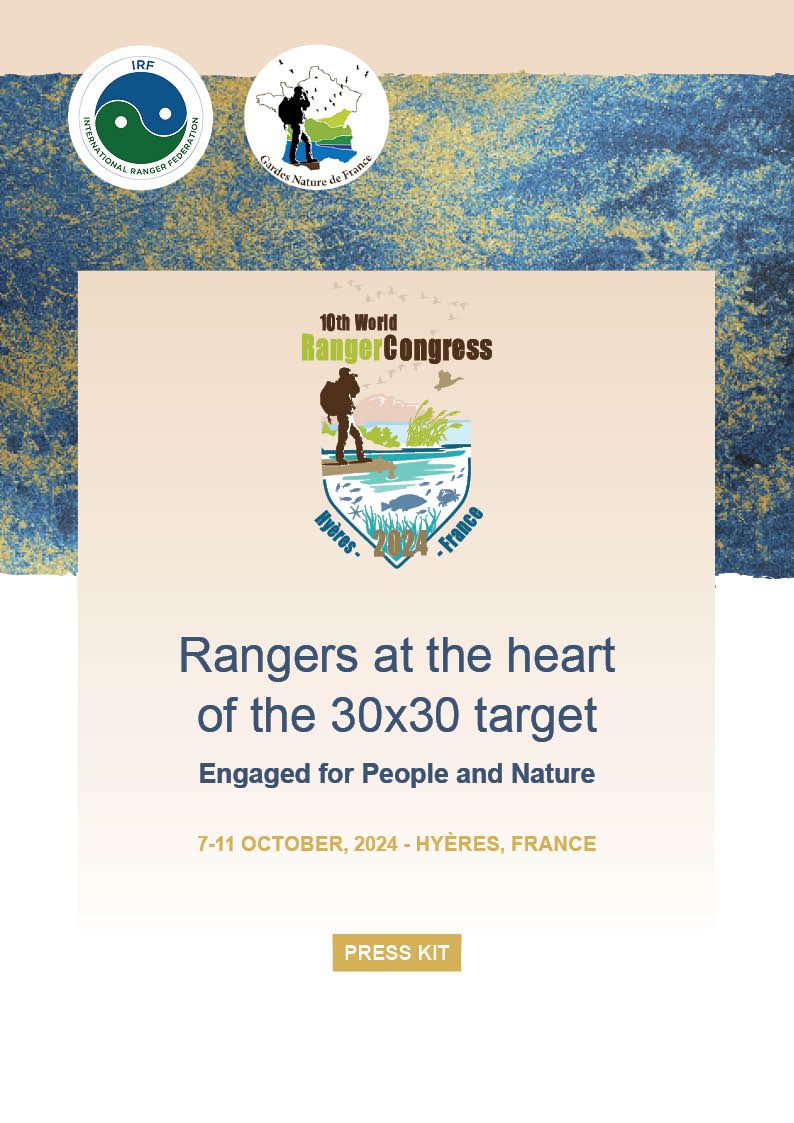PRESS
Organized by the International Ranger Federation (IRF), together with Gardes Natures de France (GNF), the World Ranger Congress (WRC) will gather more than 450 rangers for its 10th edition in Hyères, France from 7-11 October 2024 to discuss its contribution to The Biodiversity Plan.
Press conference
The press conference will be held on Tuesday 8 October 2024 from 12 to 13h at the Bélambra Clubs ‘Les Criques’, in Hyères, France. Journalists who are unable to attend in person will be able to take part in the conference remotely via this link. Journalists wishing to attend the press conference should register via this link. You are also welcome from 8am to attend the morning sessions and take photos.
Press releases
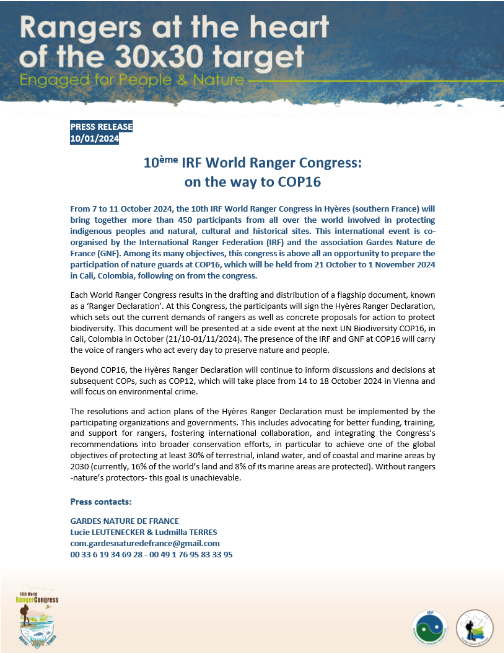
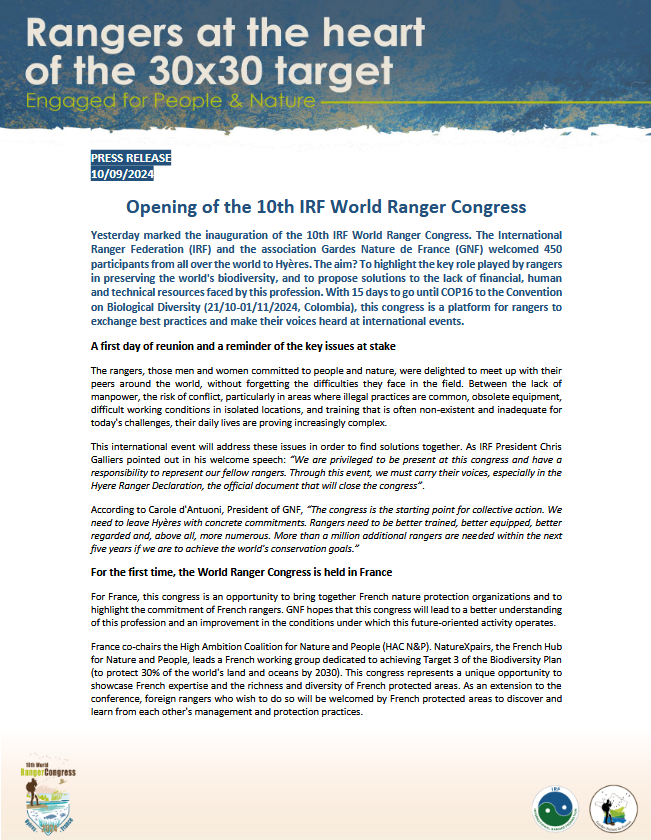
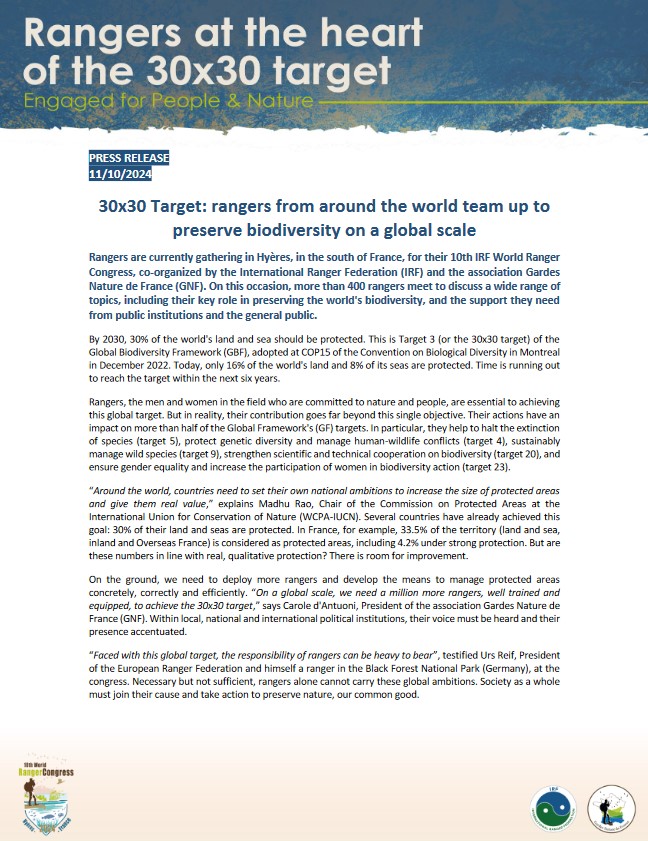
30x30 Target: rangers from around the world team up to preserve biodiversity on a global scale
Download ENDownload FRDownload ES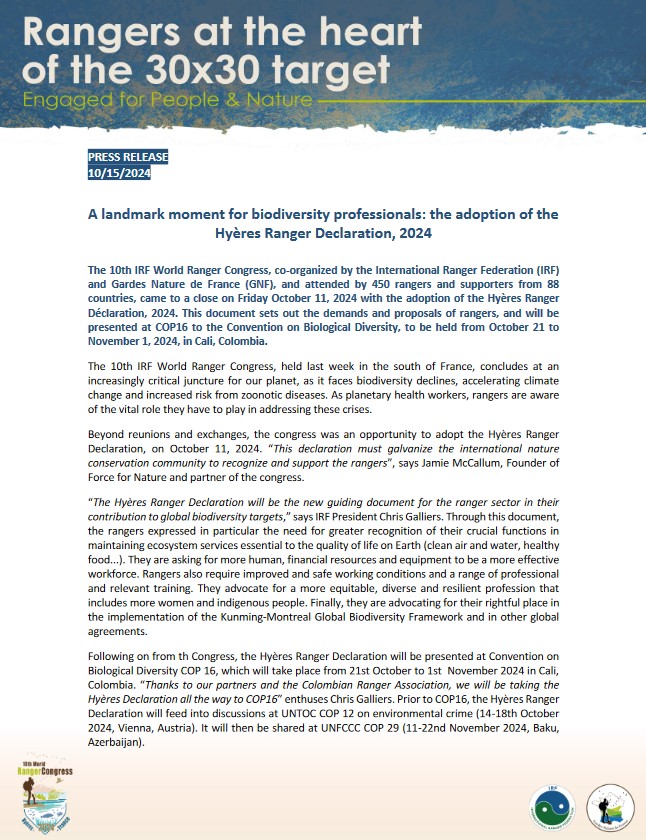
Photos
Frequently Asked Questions
WHO ARE RANGERS?
The rangers are professionals responsible for the management, protection, and conservation of natural and cultural resources within protected areas. They also enforce environmental laws, support scientific research, monitor ecological health, conduct anti-poaching patrols, engage with local communities, and educate the public about conservation. Their role is essential in ensuring the integrity of the environment and the safety of the visitors. While the specific duties of rangers can vary by region, there is a common understanding globally that rangers are frontline defenders of protected areas.
WHY ARE RANGERS IMPORTANT FOR PROTECTED AREAS?
Rangers are essential for protected areas because they enforce laws and regulations, prevent illegal activities such as poaching and logging, monitor wildlife and ecosystems, and engage with local communities and stakeholders. Their presence ensures the integrity and sustainability of these areas. Rangers provide significant added value by ensuring the effective management and protection of natural areas, thus contributing to biodiversity conservation, climate regulation, and the sustainable use of natural resources. They also foster positive relationships between protected areas and local communities and play a key role in supporting scientific research and collaborating with researchers to enhance knowledge and conservation practices.
WHY DO RANGERS NEED TO EFFECTIVELY ENSURE THE RESPECT OF PROTECTED AREAS?
To effectively protect protected areas, rangers need adequate funding, proper training, modern equipment, supportive policies, community collaboration, and robust legal frameworks.
WHAT ARE THE MAIN CHALLENGES FACED BY RANGERS?
Rangers face challenges such as:
- Inadequate funding and resources to do their job effectively
- Insufficient training and support
- Risks of violence and conflict, particularly in areas with high levels of illegal activities
- Difficult working conditions and remote locations
- Balancing conservation goals with community needs and pressures
WHAT IS THE GOAL OF A CONGRESS?
The 10th World Ranger Congress (WRC), co-organized by the International Ranger Federation (IR) and Gardes Nature de France (GNF), unites over 450 rangers from more than 100 countries. It will be a landmark event about "Contributions and developments of the ranger profession in order to achieve target 3 of The Biodiversity Plan". This target aims to conserve and manage at least 30% of the Earth's land and sea area by 2030.
The IRF WRC gives rangers the opportunity to learn new skills, share knowledge and create partnerships. It occurs every three years in a different location, allowing host countries from each IRF region to raise the profile of rangers locally and internationally. It allows them to showcase their successes, to identify how they are addressing their regional challenges and share their knowledge and skills with colleagues from around the world.
WHY ARE RANGERS IMPORTANT FOR REACHING THE 30X30?
Rangers are crucial for achieving the 30x30 target. They play a key role in managing and safeguarding these protected areas, ensuring compliance with conservation policies, and supporting biodiversity and ecosystem services.
WHAT WILL BE THE OUTPUT OF THE CONGRESS?
This year’s declaration aims to strengthen the role of rangers notably in achieving the 30x30 target of The Biodiversity Plan, advocating their inclusion in NBSAPs, recognizing their contribution to climate change mitigation, and involving them in global biodiversity discussions.
The typical output of the World Ranger Congress includes resolutions and action plans to improve ranger support and effectiveness, recommendations for policy and practice enhancements, sharing of best practices and innovative strategies, and strengthened networks and partnerships among rangers and conservation organizations. This motion aligns with the 2050 vision of living in harmony with Nature, demonstrating how rangers are essential to achieving this ambitious goal.
Organizers
The “International Ranger Federation” (IRF) is a worldwide, non-profit membership-based organization, established in 1992 to develop, advance, and promote the Ranger profession. The IRF recognises Rangers and protected and conserved area workers whether state, regional, communal, indigenous, or private, as essential on-the-ground planetary health professionals, that are responsible for safeguarding nature, and cultural and historical heritage, and protecting the rights and well-being of present and future generations. The IRF is the standard bearer for the Ranger profession globally and the voice of Ranger Associations and Rangers everywhere.
The “Gardes Nature de France” Association (GNF) was established on October 16, 2010, in Florac, following the National Parks Meetings. This professional association unites field agents from various natural areas in France, such as Regional Natural Parks, National Parks, Nature Reserves, Coastal Conservatory sites, and Great Sites of France, to support nature protection professionals and their institutions. GNF’s main goals include promoting the nature guard professions, networking field agents, providing solidarity and support, enhancing professionalism through experience sharing and information exchange, and organizing congresses and working groups. GNF also serves as the French section of the “International Ranger Federation” (IRF).
Press contacts
Lucie LEUTENECKER & Ludmilla TERRES
com.gardesnaturedefrance@gmail.com
00 33 6 19 34 69 28 (in french)
00 49 1 76 95 83 33 95 (in english and german)

